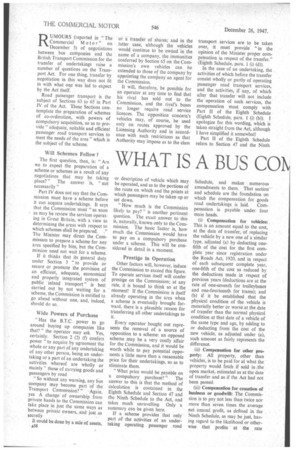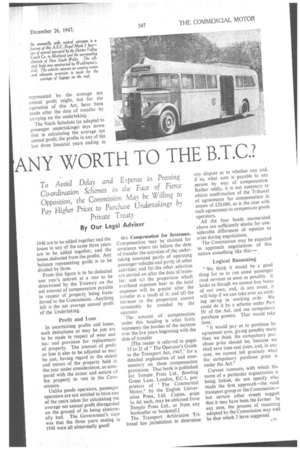WHAT IS A BUS CO ANY WORTH TO THE B.T.C.?
Page 48

Page 49

If you've noticed an error in this article please click here to report it so we can fix it.
RUMOURS (reported in "The Commercial Motor" on December 5) of negotiations between bus companies and the British Transport Commission for the transfer of undertakings raise a number of questions on the Transport Act. For one thing, transfer by negotiation in this way does not fit in with what one was led to expect by the Act itself.
Road passenger transport is the subject of Sections 63 to 65 in Part IV of the Act. These Sections contemplate the preparation of schemes of co-ordination, with powers of compulsory acquisition, so as to provide "adequate, suitable and efficient passenger road transport services to meet the needs of the area" which is the subject of the scheme.
Will Schemes Follow ?
The first question, then, is: " Are we to expect the preparation of a scheme or schemes as a result of any negotiations that may be taking place?" The answer 'is, "not necessarily" Part IV does not say that the Commission must have a scheme before it can acquire undertakings. It says that the Commission must "as soon • as may be review the services operating in Great Britain, with a view to determining the areas with respect to which schemes shall be prepared. ." The Minister may direct the Commission to prepare a scheme for any area specified by him, but the Commission need not wait for a scheme.
If it thinks that its general duty under Section 3 "to provide or secure or promote the provision of an efficient, adequate, economical and properly integrated system of public 'inland transport" is best carried out by not waiting for a scheme, the Commission is entitled to go ahead without one, and, indeed, should do so.
Wide Powers of Purchase • "Has the B.T.C. power to go around buying up companies like that?" the operator may ask, Yes, certainly. Section 2 (2) (f) confers power "to acquire by agreement the whole or any part of any undertaking of any other person, being an undertaking or a part of an undertaking the activities, whereof are wholly or mainly" those of carrying goods and passengers by road.
"So without any warning, any 15-us company may become part of the Transport Commission?" Again, yes A change of ownership from private hands to the Commission can take place in just the same ways as between private owners, and just as secretly
It could be done by a sale of assets, A38 or a transfer of shares; and in the latter case, although the vehicles would continue to be owned in the name of a company, the immunities conferred by Section 65 on the Commission's own vehicles can be extended to those of the company by appointing the comPany an agent for the Commission.
It will, therefore, be possible for an operator at any time to find that his rival has sold out to the Commission, and the rival's buses no longer require road service licences. The opposition concern's vehicles may, of course, be used only on routes approved by the Licensing Authority and in accordance with such restrictions as that Authority may impose as to the class or description of vehicle which may be operated, and as to the portions of the route on which and the points at which passengers may be taken up or set down.
" HOw much is the Commission likely to pay?" is another pertinent question. The exact answer to this is, naturally, known only to the Commission. The basic -factor is, how much the Commission would have to pay on a compulsory purchase under a scheme. This will be considered in detail in a moment.
Prestige in Operation Other factors will, however, induce the Commission to exceed this figure. To operate services itself will confer prestige on the Commission; at any rate, it is bound to think so at the Moment! If the Commission is itself already operating in the area when a scheme is eventually brought forward, there is a plausible reason for transferring all other undertakings to it.
Every operator bought out represents the removal of a source of opposition to a scheme: an opposed scheme may be a very costly affair for the Commission, and it would be worth while to pay potential opponents a little more than a reasonable price for their undertakings, so as to eliminate them.
"What price would be payable on a compulsory purchase?" The answer to this is that the method of calculation is contained in the Eighth Schedule and Section 47 and the Ninth Schedule to the Act, and takes 'much unravelling. Only a summary can be given here.
If a scheme provides that only part of the activities of an undertaking operating passenger road transport services are to be taken over, it must provide "in the opinion of the Minister proper compensation in respect of the transfer." (Eighth Schedule, para. 1 (i) (d)).
In the case of an undertaking, the activities of which before the transfer consist wholly or partly of operating passenger road transport services, and the activities, if any, of which after that transfer will not include the operation of such services, the compensation must comply with Part II of the Eighth Schedule (Eighth Schedule, para. 1 (i) (b)). I apologize for this wording, which is taken straight from the Act, although I have simplified it somewhat!
Part II of the Eighth Schedule refers to Section 47 and the Ninth Schedule, and makes numerous amendments to them. That section and schedule are the foundation on which the compensation for goods
road. undertakings is laid. Compensation is payable under four main heads.
(I) Compensation for vehicles: This is an amount equal to the cost, at the date Of transfer, of replacing the vehicle by a new one of a similar type, adjusted (a) by deducting onefifth of the cost for the first complete year since registration under the Roads Act, 1920, and in respect. of each subsequent complete year, one-fifth of the cost as reduced by the deductions made in respect of previous years (deductions are at the rate of one-seventh for trolleybuses and one-fourteenth for trams); and (b) if it be established that the physical condition of the vehicle is materially better or worse at the date of transfer than the normal physical condition at that date of a vehicle of the same type and age, by adding to or deducting from the cost of the new vehicle, as adjusted under (a), such amount as fairly represents the difference.
(ii) Compensation for other property: All property, other than vehicles, is to be paid for at what the property would fetch if sold in the open market, estimated as at the date of transfer and as if the Act had not been passed.
(iii) Compensation for cessation of business or goodwill: The Commission is to pay not less than twice nor more than seven times the average net annual profit, as defined in the Ninth Schedule, as may be just, having regard to the likelihood or otherwise that profits at the rite
represented by the average net annual profit might, but for the operation of this Act, have been made after the date of transfer by carrying on the undertaking..
The Ninth Schedule (as adapted to passenger undertakings) lays down that in calculating the average net annual profit, the profits in any of the last three financial years ending in
1948 are to be added together and the losses in any of the same three yearsare to be added together, and the losses deducted from the profits. Any balance representing profit is to be divided by three.
From this figure is to be deducted one year's interest at a rate to be determined by the Treasury on the net amount of compensation payable in respect of• property being transferred to the Commission.–Anything left is the net average annual profit of the Undertaking.
Profit and Loss In ascertaining profits and losses, such deductions as may be just are to be made in respect of wear and tea: and provision for replacement of property. The amount of profit or loss is also -to be adjusted as may be just, having regard to the extent and nature of the property held in the year under consideration, as compared with the extent and nature of the property to vest in the Commission.
Unlike goods operators, passenger operators are not entitled to have one of the years taken for calculating the average net annual profit disregarded on the ground of its being abnormally bad. The Government's view was that the three years ending in 1948 were all abnormally good! (iv) Compensation' for Severance. Compensation may be claimed for severance where (a) before the date of transfer the activities of the undertaking consisted partly of operating passenger vehicles and partly of other activities; and (b) the, other activities are carried on after the date of transfer; and (c) the proportion which overhead expenses bear to the total expenses will be greater after the transfer as a result of it; and (d) the increase in the proportion cannot reasonably be avoided by the operator.
The amount of compensation under this heading is what fairly represents the burden of the increase over the five years beginning with the date of transfer.
[The reader is referred to pages 15 to 21 of "The Operator's Guide to the Transport Act, 1947," for a detailed explanation of and commentary on these compensation provisions. That book is published for Temple Press Ltd., Bowling Green Lane, London, E.C.1, proprietors of The Commercial Motor," by the English Universities Press, Ltd. Copies, price Is. 6d. each, may be obtained from Temple Press Ltd., or from any bookseller or bookstall.] The Transport Arbitration Tribunal has jurisdiction to determine any dispute as to whether any and, if so, what sum is payable to any person by way of compensation, Rather oddly, it is not necessary to obtain confirmation of the Tribunal of agreements for compensation in excess of £20,000, as is the case with such agreements to compensate goods operators.
All the four heads enumerated above are sufficiently elastic for considerable differences of opinion to arise during negotiations.
The Commission may be expected to approach negotiations of this nature something like this:— Logical Reasoning "We think it would be a good thing for us to run some passenger road services as soon as possible. It looks as though we cannot buy buses of our own; and, in any event, it will help if we can take over an existing set-up in working orde' We could do it by a scheme under Part IV of the Act, and use compulsory purchase powers. That would take time.
"It would pay us to purchase by agreement now, giving possibly more than we think the compulsory purchase price should be, because we shall save time and costs, and, in any case, we cannot tell precisely what the compulsory purchase price is under the Act."
Current rumours, with which the name of a particular organization is being linked, do not specify who made the first approach—the road transport group or the Commission— but certain other events suggest that it may have been the former In any case, the process of reasoning adopted by the Commission may well be that which I have suggested.












































































